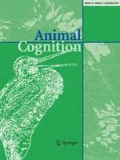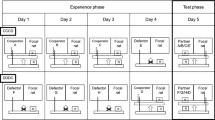Abstract
Exchanges form the basis of human economies. Animals too can engage in reciprocal interactions but they do not barter goods like humans, which raises the question of the abilities necessary for trading to occur. Previous studies have shown that non-human primates can exchange food with human partners. Here, we tested the ability of brown capuchin monkeys and Tonkean macaques to reciprocate in a task requiring two conspecifics to exchange tokens in order to obtain rewards from an experimenter. We recorded 56 transfers between subjects in capuchin monkeys and 10 in Tonkean macaques. All transfers were passive in both species. Capuchins preferentially picked up tokens valuable for them in the partner’s compartment. They tended to manipulate the partner-valued tokens more often than the no-value ones, leading to more opportunities for these tokens to end up within reach of the partner. Despite optimal conditions where values of goods were defined and known by partners, however, none of the pairs tested engaged in short-term reciprocal interactions. These results indicate that calculated reciprocity was difficult if not impossible in the animals tested.




Similar content being viewed by others
References
Addessi E, Crescimbene L, Visalberghi E (2007) Do capuchin monkeys (Cebus apella) use tokens as symbols? Proc R Soc B 274:2579–2585
Addessi E, Crescimbene L, Visalberghi E (2008a) Food and token quantity discrimination in capuchin monkeys (Cebus apella). Anim Cogn 11:275–282
Addessi E, Mancini A, Crescimbene L, Padoa-Schioppa C, Visalberghi E (2008b) Preference transitivity and symbolic representation in capuchin monkeys (Cebus apella). PLoS One 3:e2414
Amici F, Aureli F, Call J (2008) Fission-fusion dynamics, behavioral flexibility and inhibitory control in primates. Curr Biol 18:1415–1419
Arrow KJ (1974) The limits of organization. Norton, New York
Aureli F, Schaffner CM (2002) Relationship assessment through emotional mediation. Behaviour 139:393–420
Barnes JL, Hill T, Langer M, Martinez M, Santos LR (2008) Helping behaviour and regard for others in capuchin monkeys (Cebus apella). Biol Lett 4:638–640
Beran MJ (2008) Capuchin monkeys (Cebus apella) succeed in a test of quantity conservation. Anim Cogn 11:109–116
Beran MJ, Evans TA, Leighty KA, Harris EH, Rice D (2008) Summation and quantity judgments of sequentially sets by capuchin monkeys (Cebus apella). Am J Primatol 70:191–194
Brosnan SF, Beran MJ (2009) Trading behavior between conspecifics in chimpanzees, Pan troglodytes. J Comp Psychol 123:181–194
Brosnan SF, de Waal FBM (2004a) A concept of value during experimental exchange in brown capuchin monkeys (Cebus apella). Folia Primatol 75:317–330
Brosnan SF, de Waal FBM (2004b) Socially learned preferences for differentially rewarded tokens in the brown capuchin monkey, Cebus apella. J Comp Psychol 119:133–139
Cantlon JF, Brannon EM (2006) Shared system for ordering small and large numbers in monkeys and humans. Psychol Sci 17:402–407
de Waal FBM (1997) Food transfers through mesh in brown capuchins. J Comp Psychol 4:370–378
de Waal FBM (2000) Attitudinal reciprocity in food sharing among brown capuchin monkeys. Anim Behav 60:253–361
de Waal FBM, Luttrell LM (1988) Mechanisms of social reciprocity in three primate species: symmetrical relationships characteristics or cognition? Ethol Sociobiol 9:101–118
de Waal FBM, Luttrell LM, Canfield ME (1993) Preliminary data on voluntary food sharing in brown capuchin monkeys. Am J Primatol 29:73–78
de Waal FBM, Leimgruber K, Greenberg AR (2008) Giving is self-rewarding for monkeys. Proc Nat Acad Sci USA 105:13685–13689
Drapier M, Chauvin C, Dufour V, Uhlrich P, Thierry B (2005) Food-exchange with humans in brown capuchin monkeys. Primates 46:241–248
Dufour V, Pelé M, Neumann M, Thierry B, Call J (2009) Calculated reciprocity after all: computation behind token transfers in orang-utans. Biol Lett 5:172–175
Dugatkin LA (1997) Cooperation among animals: an evolutionary perspective. Oxford University Press, Oxford
Evans TA, Beran MJ, Harris EH, Rice DF (2009) Quantity judgments of sequentially presented food items by capuchin monkeys (Cebus apella). Anim Cogn 12:97–105
Hemelrijk CK (1996) Reciprocation in apes: from complex cognition to self-structuring. In: McGrew WC, Marchant LF, Nishida T (eds) Great apes societies. Cambridge, Cambridge University Press, pp 185–195
Mauss M (1923/24) Essai sur le don. Ann Sociol 1:30–186
Mundry R, Fischer J (1998) Use of statistical programs for nonparametric tests of small samples often leads to incorrect P values: examples from Animal Behaviour. Anim Behav 56:256–259
Noë R, Hammerstein P (1994) Biological markets: supply and demand determine the effect of partner choice in cooperation, mutualism and mating. Behav Ecol Sociobiol 35:1–11
Padoa-Schioppa C, Jandolo L, Visalberghi E (2006) Multi-stage mental process for economic choice in capuchins. Cognition 99:B1–B13
Pelé M, Dufour V, Thierry B, Call J (2009) Token transfers among great apes: species differences, gestural requests and reciprocal exchange. J Comp Psychol 123:375–384
Pelé M, Micheletta J, Uhlrich P, Thierry B, Dufour V (2010a) Delay maintenance in Tonkean macaques and brown capuchin monkeys. Int J Primatol (in press)
Pelé M, Dufour V, Micheletta J, Thierry B (2010b) Long-tailed macaques display unexpected waiting abilities in exchange tasks. Anim Cogn 13:263–271
Ramseyer A, Pelé M, Dufour V, Chauvin C, Thierry B (2006) Accepting loss: the temporal limits of reciprocity in brown capuchin monkeys. Proc R Soc B 273:179–184
Sahlins M (1972) Stone age economics. New York, Hawthorne
Seyfarth RM, Cheney DL (1984) Grooming, alliances and reciprocal altruism in vervet monkeys. Nature 308:541–543
Siegel S, Castellan NJ (1988) Nonparametric statistics for the behavioral sciences. McGraw-Hill, Singapore
Sokal RR, Rohlf FJ (1969) Biometry: the principles and practice of statistics in biological research. Freeman, San Francisco
Thierry B, Anderson JR, Demaria C, Desportes C, Petit O (1994) Tonkean macaque behaviour from the perspective of the evolution of Sulawesi macaques. In: Roeder JJ, Thierry B, Anderson JR, Herrenschmidt N (eds) Current primatology, vol 2. Université Louis Pasteur, Strasbourg, pp 103–117
van Marle K, Aw J, McCrink K, Santos LR (2006) How capuchin monkeys (Cebus apella) quantify objects and substances. J Comp Psychol 120:416–426
Westergaard GC, Suomi SJ (1997) Transfer of tools and food between groups of tufted capuchins (Cebus apella). Am J Primatol 43:33–41
Westergaard GC, Liv C, Chavanne TJ, Suomi SJ (1998) Token-mediated tool-use by a tufted capuchin monkey (Cebus apella). Anim Cogn 1:101–106
Westergaard GC, Liv C, Rocca AM, Cleveland A, Suomi SJ (2004) Tufted capuchins (Cebus apella) attribute to foods and tools during voluntary exchanges with humans. Anim Cogn 7:19–24
Westergaard GC, Evans TA, Howell S (2007) Token mediated tool exchange between tufted capuchin monkeys (Cebus apella). Anim Cogn 10:407–414
Yamamoto S, Tanaka M (2009) Spontaneously take turns in a reciprocal cooperation task? J Comp Psychol 123:242–249
Acknowledgments
We are grateful to E. Suarez and J. Devillechabrolle for valuable assistance with the monkeys, and reviewers for fruitful comments. The research was supported by a grant from the Agence Nationale de la Recherche (ANR-08-BLAN-0042-01).
Author information
Authors and Affiliations
Corresponding author
Electronic supplementary material
Below is the link to the electronic supplementary material.
Rights and permissions
About this article
Cite this article
Pelé, M., Thierry, B., Call, J. et al. Monkeys fail to reciprocate in an exchange task. Anim Cogn 13, 745–751 (2010). https://doi.org/10.1007/s10071-010-0325-x
Received:
Revised:
Accepted:
Published:
Issue Date:
DOI: https://doi.org/10.1007/s10071-010-0325-x




